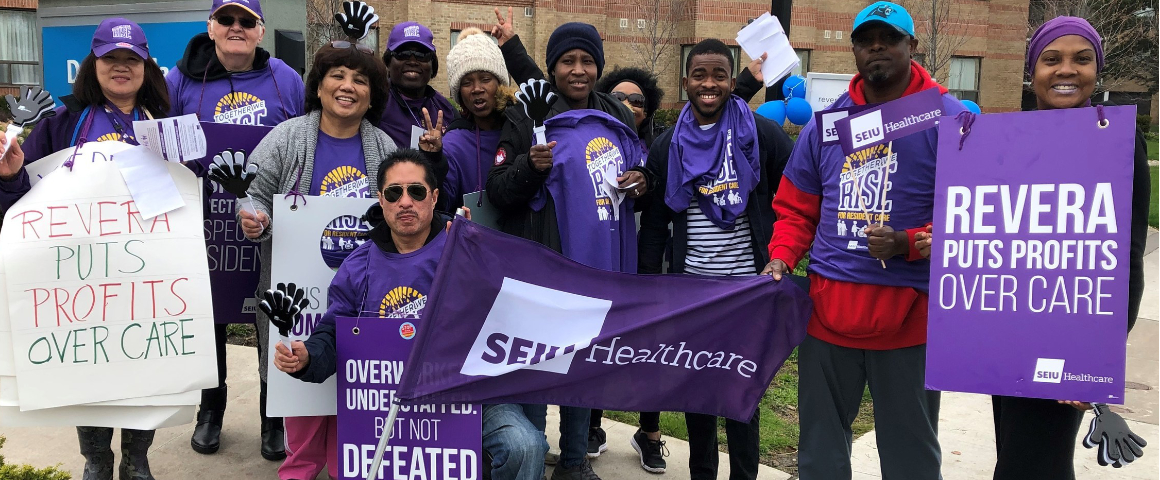By Stuart Ryan
If you ask people in Canada about the most important issue in a federal election campaign, they often say it is the public healthcare system, Medicare.
There is, however, a gap in public healthcare, and that is long-term care (LTC). For-profit corporations dominate the LTC industry in Canada.
Research by Professor Pat Armstrong at Toronto’s York University concluded that for-profit long-term care homes tend to have lower staffing levels. “These managerial practices involve paying the lowest wages possible, hiring part-time and casual staff, and those defined as self-employed, in order to avoid paying benefits and providing other protections.”
It is precisely these exploitative profit-maximizing practices that have proven to be so dangerous for workers and residents during the pandemic.
Revera is the second-largest for-profit LTC corporation in Canada. It is 100 percent owned by the Public Sector Pension Investment Board of Canada (PSP), a federal crown corporation which invests the pension money of the federal public service workers, the RCMP and the military. PSP board members are appointed by the members of the federal cabinet, and the cabinet minister in charge is the head of the Treasury Board, Jean-Eves Duclos.
When Doug Ford became Premier of Ontario, at the request of the owners of LTC homes the provincial government stopped the practice of unannounced Ministry of Health inspections at LTC facilities.
So, what is the significance of all this? Quite literally, it is the life and death of the residents and staff at Revera and other for-profit homes.
Revera owns Carlingview Manor, a long-term care home in Ottawa where 44 percent of the residents and staff became infected when the pandemic hit. Seventy-three residents and staff at Carlingview Manor have died from COVID-19. The situation became so dire that medical staff at the Ottawa hospital came to Carlingview Manor to deal with the crisis.
Christine Collin’s brother Peter lives at Carlingview Manor. She hopes he will be transferred to the Ottawa Grace Manor, a non-profit home run by the Salvation Army. There have been no cases of COVID-19 at Ottawa Grace Manor, and no deaths.
The Public Service Alliance of Canada (PSAC) has been tracking Revera since a strike in 2012 at its Edmonton facilities. When the pandemic hit the union said enough was enough, and on May 26, 2020, PSAC President Chris Aylward wrote the directors of the PSP demanding that it divest from Revera and make it publicly owned. The PSP has not done this.
Kevin Skerrett is a pension researcher at the Canadian Union of Public Employees (CUPE), who advises CUPE bargaining teams on the best pensions for their members. He notes the significance of Aylward’s letter: “For the first time in memory, a federal-government public service employees union, the Public Service Alliance of Canada condemned the PSP for owning Revera.”
Skerrett is also a member of the Ottawa Health Coalition and is involved with the Make Revera Public campaign. The campaign is part of a larger effort to bring LTC under public ownership.
To date, Make Revera Public has been endorsed by 15 unions representing public service workers, as well as the Ontario Health Coalition and the Manitoba Health Coalition, and is building.
The Professional Institute of the Public Service of Canada (PIPSC) organized a well-attended webinar about the campaign with Linda Silas of the Canadian Federation of Nurses Unions (CFNU).
The Canadian Health Coalition (CHC) has an open letter on its website (“Fix long-term care: Make Revera public”) that calls on the PSP to make Revera public. The CHC describes this as “the first step in bringing all privately-owned, for-profit long-term care facilities where they belong – into public ownership and operation.”
The Ontario Health Coalition is organizing a “No More Profiting from Pain” rally on September 13 at Queen’s Park. The coalition says it holds the Ford government accountable for the thousands of deaths in LTC homes in Ontario and calls for public ownership of long-term care.
[Photo: SEIU Healthcare]
[hr gap=”10″]
Get People’s Voice delivered to your door or inbox!
If you found this article useful, please consider subscribing to People’s Voice.
We are 100% reader-supported, with no corporate or government funding.




